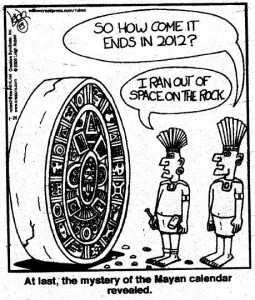Although Google internally updates the PageRank score on a daily basis, they only export the data to the Google Toolbar periodically. Now I am far from being a supporter of the Google PR and, more importantly, of the fuss it’s causing amongst marketers. However, Google’s see-saw declarations on the matter force me to take the PageRank score into consideration and to keep a check on PR updates. Wouldn’t want to disappoint High Priest Matt Cutts now, would we? What follows is a list of the more recent Google PR updates, estimated through personal observations, community feedback and conjecture:

Google PR is to marketers what the Mayan stone calendar is to archaeologists
30 October 2009
23 June 2009
18 May 2009
1 April 2009
3 December 2008
27 September 2008
26 July 2008
26 February 2008
11 January 2008
27 October 2007
29 April 2007
14 January 2007

![[Ask]](https://seo-wolf.com/wp-content/plugins/bookmarkify/ask.png)
![[del.icio.us]](https://seo-wolf.com/wp-content/plugins/bookmarkify/delicious.png)
![[Digg]](https://seo-wolf.com/wp-content/plugins/bookmarkify/digg.png)
![[Facebook]](https://seo-wolf.com/wp-content/plugins/bookmarkify/facebook.png)
![[Google]](https://seo-wolf.com/wp-content/plugins/bookmarkify/google.png)
![[LinkedIn]](https://seo-wolf.com/wp-content/plugins/bookmarkify/linkedin.png)
![[Mister Wong]](https://seo-wolf.com/wp-content/plugins/bookmarkify/misterwong.png)
![[Reddit]](https://seo-wolf.com/wp-content/plugins/bookmarkify/reddit.png)
![[Squidoo]](https://seo-wolf.com/wp-content/plugins/bookmarkify/squidoo.png)
![[StumbleUpon]](https://seo-wolf.com/wp-content/plugins/bookmarkify/stumbleupon.png)
![[Twitter]](https://seo-wolf.com/wp-content/plugins/bookmarkify/twitter.png)
![[Yahoo!]](https://seo-wolf.com/wp-content/plugins/bookmarkify/yahoo.png)
![[Email]](https://seo-wolf.com/wp-content/plugins/bookmarkify/email.png)

Google’s War On Blog Comment Spam
I recently heard from a bird (actually, it was a beard, an Andy Beard, to be precise) that Google has introduced a penalty for blog comment spamming. As it usually happens, Google won’t admit to being a late bloomer in any issue regarding web usability. Accordingly, the tone of the original post (published by Adel Saoud and Paolo Petrolini on the Google Webmaster Central Blog) implied that Google already applied ranking sanctions for comment spamming and that this message is just an informative update. Truth of the matter is, Google is probably just starting to take actions against abusive links posted in the comments section of blogs.
What does it all mean?
Long story, short, your blog relevancy is affected by the links posted in your post comments and if you do not manage to tidy up that particular section, you will suffer TrustRank penalties and ultimately drop in the rankings. I have to agree with Google on this, it makes sense, up to a point. But first, let’s look at the official arguements, quoted straight from the horse’s mouth (or, in this case, the GWC):
True enough. A blog’s comments section is a space designed for on-topic interaction and dispute. A comment box stuffed with irrelevant links not only ruins the user experience, it also downgrades the actual article to which it comments.
This might just be a bluff on Google’s part, in an effort to ward off any potential spammers, by reaffirming its position as the web’s ultimate relevancy arbiter. In truth, Google probably has little control over the quality of links posted within the comment section of a blog and the comment spam detection system is probably just in its infancy state.
Here we may have actually stumbled upon the real stake of this message. Introducing a blog comment filter in the ranking algorithm might just be another one of Google’s efforts to limit the SEO bad boys’ arsenal.
What can we do about it?
Most blogs feature intelligent spam filtering solutions (speaking strictly from WordPress experience), but there still isn’t a 100% guaranteed method of absterge comment spammers from your blog permanently. In the post’s conclusion, Saoud and Petrolini were kind enough to offer some suggestions to zealous webmasters who want to limit spammers’ access to their system and, consequently protect their precious rankings:
Fair enough. Providing minimum information (e.g. a nickname and an email address) shouldn’t be too much of a hassle for your potential commentators. However, this method has revealed its vulnerabilities, with the advent of Black Hat automation software.
Being an adversary of the dreaded CAPTCHA, I can not applaud this suggestion, especially since it is just as vulnerable to the above mentioned threat. So why stress your visitors with a cacographic abomination, when you can just as effectively ask him/her to provide minimum identification?
There are still people who disable comment moderation?
I usually support adding the “nofollow” attribute to outgoing links of any type, but this can prove to be a problem, especially if you want to monetize your blog (hint: affiliate marketing). You can sacrifice a lot of link love this way and it is very unlikely that hardcore spam freaks will be discouraged by the “nofollow” attribute, assuming they know what that even is.
No. No. No.
Again, risky territory, especially for those webmasters who try to cash in on their ranking positions for certain keywords (hint: affiliate marketing, once again)
My own two cents
Although the obvious benefits of waging war against comment spamming can not be denied, this new take does raise some questions. Like where does Google draw the line between a spammer and a harmless marketer, trying to add valuable input to a post and to promote his own website in the process? Or where are the battle lines drawn? Will quality matter or will the deciding factor be quantity and chance, in the end? And last, but by no means least, there is something to be discussed about the practical application of the comment spam filtering. Needless to say, Google’s warning targets only webmasters who host comment spams on their blogs and not the spammers themselves. This makes sense, since it would be damn near impossible to chastise a website for link spam on one blog, if it runs a completely legit link building strategy the rest of the time. In addition, Andy Beard makes an interesting assertion at the end of his report of the GWC announcement, asking what if a competitor was trying to sabotage your ranking by spamming your blog’s comments section?
Whether the comment spam penalty will add value to the user’s experience online or not, will be determined by time and the adaptability of the community. The idea in itself starts out as a good one. But, then again, so did communism…
27 Nov 2009
Tags: blog comment, comment spam, Google, google algorithm, google ranking, ranking factors, spam
Posted in Google | 4 Comments »